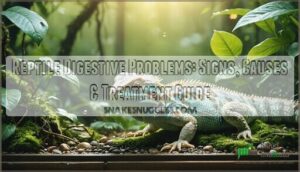This site is supported by our readers. We may earn a commission, at no cost to you, if you purchase through links.

Poor diet, inadequate heating, and dehydration are the main culprits behind these issues. Your reptile’s gut health depends on proper temperature regulation, consistent hydration, and balanced nutrition.
Maintaining clean habitat conditions prevents bacterial imbalances that trigger digestive distress. If symptoms persist beyond 48 hours or you see severe bloating without bowel movements, seek immediate veterinary care. Understanding the specific causes and prevention strategies can save your reptile’s life.
Table Of Contents
- Key Takeaways
- Common Digestive Problems in Reptiles
- Warning Signs of Digestive Distress
- Key Factors Impacting Reptile Gut Health
- Preventing Digestive Issues in Reptiles
- When to Seek Veterinary Care
- Frequently Asked Questions (FAQs)
- Do reptiles have digestive problems?
- Do reptiles have health issues?
- What diseases do reptiles suffer from?
- Why do reptiles have egg-binding problems?
- Are respiratory infections common in reptiles?
- How do you know if a reptile is sick?
- Can reptiles eat frozen or live prey?
- How often should I feed my reptile?
- What foods are toxic to reptiles?
- Do reptiles need digestive enzyme supplements?
- Conclusion
Key Takeaways
- You’ll spot digestive problems early by watching for sudden appetite loss, lethargy, and visible abdominal swelling—these warning signs can escalate quickly from minor discomfort to life-threatening emergencies.
- You can prevent most digestive issues by maintaining proper temperature regulation, consistent hydration, balanced nutrition, and clean habitat conditions that support your reptile’s gut health.
- You should seek immediate veterinary care if symptoms persist beyond 48 hours or if you notice severe bloating without bowel movements, as impactions and obstructions require professional intervention.
- You’ll avoid common digestive problems by feeding species-appropriate diets, removing uneaten food within 24 hours, maintaining proper temperatures, and quarantining new reptiles for 30-60 days.
Common Digestive Problems in Reptiles
You’ll encounter three primary digestive issues when caring for reptiles: bloating from gas buildup, impaction from blockages, and constipation from poor diet or dehydration.
These conditions can escalate quickly from minor discomfort to life-threatening emergencies if you don’t recognize the warning signs early.
Bloating and Gas Build-Up
Through dietary changes and environmental stress, your reptile’s digestive system can develop painful gas buildup that threatens their health. Reptile gut bacteria imbalances often trigger these digestive problems, requiring immediate attention to prevent serious reptile health issues.
- Poor digestion from temperature fluctuations slows gut transit
- Moldy food increases dangerous gas production levels
- Digestive enzyme supplements may help restore proper function
- Dietary fiber management prevents future gas accumulation episodes
Regular check-ups with a reptile health expert can help identify potential issues early on.
Impaction and Bowel Obstruction
When your reptile swallows substrate or large food pieces, gut impaction creates a dangerous bowel blockage that stops normal digestive function. This intestinal obstruction requires immediate veterinary attention because severe cases need reptile surgery to prevent bowel rupture.
Unlike simple digestive disorders, these bowel obstructions can quickly become life-threatening digestive system problems requiring emergency intervention to restore proper gut health.
Constipation Causes and Symptoms
When your reptile’s gut motility slows down, constipation becomes a real concern. Poor stool quality often signals digestive system trouble ahead. Dehydration effects compound the problem, making waste harder to pass. Low dietary fiber intake disrupts normal digestion patterns.
Watch for straining, reduced appetite, and lethargy—these symptoms indicate your pet’s gut health needs immediate attention to prevent serious bowel obstructions.
Warning Signs of Digestive Distress
You’ll notice several clear warning signs when your reptile develops digestive problems that require immediate attention. Watch for sudden loss of appetite, unusual lethargy, behavioral changes like hiding or aggression, and visible abdominal swelling that indicates serious internal issues.
Loss of Appetite
When your reptile suddenly stops eating, this red flag signals potential gut health issues or underlying digestive disorders. Loss of appetite often indicates malabsorption issues or nutrient deficiency requiring immediate feeding strategies adjustments.
Recognizing early signs of digestive distress, such as lethargy and loss of appetite, is vital for addressing snake health issues.
- Your pet’s refusal to eat feels heartbreaking and scary
- Watching their once-enthusiastic feeding response disappear creates deep worry
- The silence at feeding time hits differently than any sound
- Food aversion in your beloved reptile triggers protective instincts
Lethargy and Behavioral Changes
Three critical Behavioral Signs emerge when reptiles develop Digestive Problems. You’ll notice decreased activity levels, unusual hiding patterns, and reduced Social Interaction with their environment.
These Gut Health Issues create Stress Factors that alter normal behaviors. Environmental Enrichment becomes less appealing as their digestive system struggles.
Unlike simple Appetite Changes, lethargy affects their entire routine, signaling serious digestion complications requiring immediate attention.
Visible Abdominal Swelling
Swollen bellies often signal serious gut blockages or inflammatory diseases in your reptile. You’ll notice the abdomen looks unnaturally distended, sometimes with visible abdominal masses beneath the skin.
This swelling can indicate bowel obstructions from impacted food, substrate ingestion, or abscesses developing internally.
Don’t dismiss reptile obesity as harmless—extra weight compounds digestive problems and creates additional health risks.
Key Factors Impacting Reptile Gut Health
Your reptile’s gut health depends on several critical environmental and dietary factors that you can control. Proper temperature regulation, consistent hydration, balanced nutrition, and clean habitat conditions work together to maintain ideal digestive function and prevent serious health complications.
Diet Quality and Nutritional Balance
Poor nutrition acts like a domino effect on your reptile’s digestive system. Balanced Nutrient Requirements prevent gut dysfunction, while Food Variety promotes Natural Digestive Balance.
Your reptile’s Vitamin Balance and Calcium Supplements work together to maintain healthy digestion. Proper Dietary Formulation promotes healthy Gut Health, helping reptiles process food efficiently and avoid costly digestive complications.
A well-planned diet should include reptile nutrition guidelines to guarantee overall health.
Hydration and Water Access
Adequate hydration drives proper digestive function in your reptile. Fluid Balance affects nutrient absorption and waste elimination. Monitor these critical factors:
- Water Quality should be clean and changed regularly
- Dehydration Signs include sunken eyes and lethargy
- Drinking Behavior varies by species preferences
- Humidity Control aids reptile health alongside direct water access
Habitat Cleanliness and Hygiene
Maintaining clean enclosures prevents harmful bacteria from disrupting your reptile’s digestive system. Proper hygiene practices include removing uneaten food within 24 hours and spot-cleaning waste immediately.
Sanitation protocols require weekly deep cleaning with reptile-safe disinfection methods. Regular cleaning schedules help prevent reptile health issues, as dirty environments breed pathogens that cause serious digestive problems requiring veterinary intervention.
Temperature and Humidity Control
Temperature and humidity levels directly affect your reptile’s digestion through thermoregulation methods and metabolic processes. Improper climate control disrupts enzyme function, causing digestive disorders and slowing food breakdown.
Environmental monitoring systems help maintain ideal heat sources and humidity levels. When these factors fluctuate, reptile digestive problems emerge quickly, making consistent reptile care essential for reptile health.
Preventing Digestive Issues in Reptiles
You can prevent most digestive problems in reptiles by maintaining proper diet, hydration, and habitat conditions.
Focus on species-appropriate nutrition, clean water access, ideal temperatures, and quarantine protocols for new animals.
Dietary Adjustments and Fiber Intake
Balanced nutrition forms the cornerstone of reptile digestive health. You’ll need to boost fiber intake through targeted dietary adjustments that support the gut microbiome and natural digestive balance. These changes help prevent common digestive problems:
- High-fiber foods – Add leafy greens, squash, and appropriate vegetables to increase dietary variety
- Fiber supplements – Use cellulose powder or specialized reptile supplements for consistent nutrient balance
- Gut health monitoring – Watch your reptiles’ digestion patterns after dietary changes
Proper Feeding Practices
When you establish consistent feeding schedules, you’re setting your reptile up for digestive success. Create a structured approach that considers your pet’s specific needs and natural feeding patterns.
| Feeding Aspect | Best Practice | Why It Matters |
|---|---|---|
| Meal Timing | Fixed daily schedule | Helps natural digestive rhythm |
| Food Variety | Rotate different foods weekly | Prevents nutrient deficiencies |
| Portion Control | Size appropriate to reptile | Avoids impaction risks |
| Meal Preparation | Fresh, properly sized items | Ensures ideal nutrient balance |
| Supplement Timing | With calcium-rich foods | Enhances gut health naturally |
Smart meal preparation involves offering appropriately sized food items that won’t overwhelm your reptile’s digestive system. Dietary supplements should complement, not replace, a varied diet that maintains natural digestive balance. Understanding proper reptile food choices is vital for preventing digestive issues in reptiles.
Environmental Management
Your reptile habitat design directly impacts digestive health. Temperature control systems must maintain species-specific ranges, while humidity management prevents stress-related digestive problems.
Proper lighting systems support natural behaviors and metabolism.
Regular waste removal prevents bacterial growth that can cause gut issues. Monitor temperature and humidity levels daily using reliable gauges for ideal reptile care.
Quarantining New Reptiles
New arrivals need proper quarantine protocols before joining your collection. Set up a separate isolation area for 30-60 days to prevent disease transmission. This biosecurity measure protects existing reptiles from potential pathogens that could trigger digestive problems.
Monitor new reptile care closely during acclimation, watching for stress-related digestive issues. Effective isolation techniques safeguard your entire reptile health program. Understanding the disease prevention methods is vital for a successful quarantine.
When to Seek Veterinary Care
You should contact a reptile veterinarian immediately if your pet shows persistent digestive symptoms lasting more than 48 hours or emergency signs like severe bloating with no bowel movements.
Don’t wait when digestive problems escalate—early intervention prevents complications that can become life-threatening within days.
Persistent Digestive Symptoms
When digestive problems persist beyond a few days, your reptile needs professional attention. Chronic diarrhea, ongoing stomach pain, and repeated vomiting signal serious digestive disorders.
These symptoms often indicate malabsorption issues, disrupted gut bacteria, or inflammatory responses that won’t resolve naturally. Bowel obstructions require immediate intervention, while compromised digestive enzymes need targeted treatment only veterinarians can provide.
Emergency Situations (Severe Bloating, No Bowel Movements)
When severe bloating or complete absence of bowel movements occurs, immediate Emergency Care becomes critical. Bowel obstructions can rapidly become life-threatening emergencies requiring urgent intervention.
Watch for these red flags requiring immediate veterinary attention:
- Rock-hard abdominal swelling with visible distension
- Complete absence of defecation for 7+ days
- Signs of severe stomach pain like writhing or refusal to move
Don’t attempt Reptile First Aid for digestive disorders—professional Critical Interventions are needed to address bowel blockage safely. Understanding gastrointestinal disease is essential for recognizing the severity of these symptoms.
Diagnostic Tests and Treatment Options
Your vet will run specific tests to pinpoint what’s wrong. Blood work analysis reveals infections and organ function. Imaging techniques like X-rays show bowel obstructions clearly.
Endoscopy procedures let vets see inside your reptile’s digestive tract. Surgical interventions might be needed for severe blockages.
Medication therapy treats bacterial infections and reduces inflammation in digestive disorders.
Frequently Asked Questions (FAQs)
Do reptiles have digestive problems?
An ounce of prevention beats a pound of cure" rings true here. Yes, you’ll encounter digestive issues like bloating, impaction, and constipation in reptiles.
These problems stem from poor diet, dehydration, or unsuitable environments, but they’re preventable with proper care.
Do reptiles have health issues?
Yes, you’ll encounter various health issues with reptiles. They’re susceptible to respiratory infections, metabolic bone disease, skin problems, heart disorders, and reproductive complications.
Early detection and proper veterinary care help prevent serious complications.
What diseases do reptiles suffer from?
Like a house of cards, your reptile’s health can collapse quickly from various diseases. You’ll encounter respiratory infections, metabolic bone disease, skin conditions, digestive blockages, and septicemia—all requiring prompt veterinary attention.
Why do reptiles have egg-binding problems?
Egg-binding happens when you don’t provide proper nesting sites, adequate calcium, or correct temperatures. Stress from poor husbandry, dehydration, and nutritional deficiencies prevent normal egg-laying, creating dangerous blockages.
Are respiratory infections common in reptiles?
Like unwelcome guests crashing your reptile’s party, respiratory infections are extremely common in captive reptiles. You’ll encounter bacterial, viral, or fungal causes that can quickly become life-threatening without prompt treatment.
How do you know if a reptile is sick?
You’ll notice changes in behavior, appetite, and appearance. Watch for lethargy, refusing food, unusual breathing, discharge from eyes or nose, skin discoloration, and abnormal postures or movements.
Can reptiles eat frozen or live prey?
Both work well for reptiles. Frozen-thawed prey is usually safer than live food, preventing injuries from defensive prey. Living prey can stress or harm your reptile when it’s not hungry. Always thaw frozen items completely before feeding.
How often should I feed my reptile?
Feeding frequency depends on your reptile’s species, age, and size. Most lizards like a meal every two to three days, while snakes eat once weekly for adults, twice for juveniles. Young reptiles need more frequent meals than adults.
What foods are toxic to reptiles?
Avoid onions and garlic, azaleas, rhododendrons, and yews — they’re dangerous to your scaly friend. Skip spinach, kale, and broccoli which block calcium absorption. Chocolate, alcohol, and caffeine are also off-limits.
Do reptiles need digestive enzyme supplements?
Most healthy reptiles don’t need digestive enzyme supplements if you’re providing proper diet and habitat conditions.
However, elderly reptiles or those recovering from illness might benefit from temporary supplementation under veterinary guidance.
Conclusion
Apparently, your reptile’s digestive system wasn’t designed to handle yesterday’s questionable feeding decisions. Reptile digestive problems don’t resolve themselves through wishful thinking or ignoring symptoms.
You’ve learned the warning signs, causes, and prevention strategies that keep your scaly companion healthy. Proper temperature regulation, balanced nutrition, and clean habitats form your defense against impaction and bloating.
When symptoms persist beyond two days or severe complications arise, don’t hesitate to contact an exotic veterinarian immediately.
- https://pubmed.ncbi.nlm.nih.gov/37822870/
- https://www.petmd.com/reptile/conditions/digestive/c_rp_cryptosporidiosis
- https://www.sciencedirect.com/science/article/pii/S2213224425000045
- https://www.merckvetmanual.com/all-other-pets/reptiles/disorders-and-diseases-of-reptiles
- https://talis-us.com/blogs/news/improve-your-reptiles-gut-health-with-these-nutritious-foods















